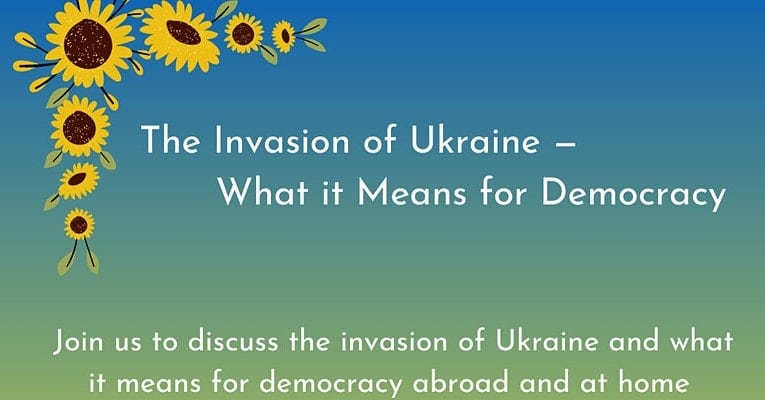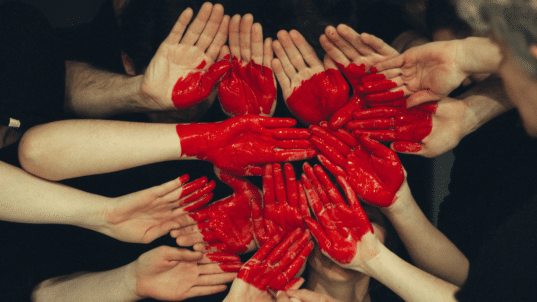 The invasion of Ukraine is one of those horrific events that can force us to look up and consider, or reassess, what we thought we understood about the state of the world and its foundations. Basic questions and concerns about war and peace, human rights, foreign relations, and democracy are all too tragically brought into close focus as we struggle to reimagine the bigger picture.
The invasion of Ukraine is one of those horrific events that can force us to look up and consider, or reassess, what we thought we understood about the state of the world and its foundations. Basic questions and concerns about war and peace, human rights, foreign relations, and democracy are all too tragically brought into close focus as we struggle to reimagine the bigger picture.
Participants in our first session of this three-part series on the Invasion of Ukraine & What it Means for Democracy were asked to share their initial questions and concerns and explore what they might mean for democracy and for the world. While the longer-term, bigger-picture may yet be out of view, two things were clear from their discussion: first, there is a wide range of different concerns and issues in reaction to the invasion, and second, many of those concerns and issues are intertwined—from horrifying to heroic, from the past to the present, and from local to global. Scroll down this page to see a summary of some of the concerns and issues brought forth in this first session.
What are the key questions we face with the invasion of Ukraine? Whether or not you were able to join us for this first discussion, we encourage you to join us online for the 2nd and 3rd sessions on March 24th and 31st at 1 PM (ET). On March 24th, we’ll help each other to sharpen our sense of the core questions that we face with the invasion of Ukraine. We’ll also explore the different values or interests that could shape the possible answers. On March 31st, we look ahead and seek to develop some different possibilities for moving forward. The events are free and you can register for both sessions via Eventbrite.
A summary of some of the ideas, concerns, and issues discussed in this first session
Humanitarian Concerns
- For the utter horror, brutality, death, and destruction being waged upon Ukraine and its people
- For the separated families
- For the refugees, for their basic needs—food, water, shelter, medical care
- For the trauma, the severe emotional distress and psychological toll
- For the toll upon generations both young and old
- For the war on an entire culture or “people,” which is a form of genocide
- For and the physical destruction of homes, property, and infrastructure
- For the countries and people accepting and caring for the refugees
- For the longer term, and what may happen as the war drags on and public interest and support wane
- These concerns bring feelings of
- Deep sadness, despair, frustration, horror, shock, surprise, and anger
- Admiration and even awe for the inspiring courage, determination, nobility, and heroism of the Ukrainian people in fighting back; and for the care and compassion shown by their neighbors and by Ukrainians for each other
- Concerns about whether Americans, and others, have been equally concerned for and supportive of other countries and refugees in other conflicts
Democracy Concerns
- That democracy is under attack, not just militarily in Ukraine in the near term, but for some years and throughout the world as authoritarian leaders and parties have come to power
- A realization that we need to better understand the essential elements, and the strengths and weaknesses of our own democracy
- That democracy has declined in the US as well in the form of—
- Increased gerrymandering
- Increased restrictions on access to the vote
- Laws designed to convert non-partisan election positions into partisan ones
- Ongoing minority rule via the filibuster, control of the courts
- Movements to ban books and restrict the teaching of certain topics
- Efforts to stifle protest
- A violent insurrection attempting to overturn the popular vote and obstruct the peaceful transition of power
- Increasing financial control over our electoral democracy
- That America’s international standing on democracy has been hurt by this decline
- A hope that perhaps this war might be an occasion to refocus and revitalize democracy—both in American and throughout the world
- What might the war’s focus on Russian oligarchs mean for their American counterparts and for their role in our democracy?
- An acknowledgement that democracy is fragile and needs not just strong internal institutions, norms, and safeguards, but also strong international coalitions and support among democratic nations
- A renewed sense of the importance in a democracy of—
- Constitutional checks and balances with limits on power
- Constitutional protections for basic civil and human rights
- A free press focused on truth-telling and countering misinformation
- Campaign finance restrictions
- Transparency in decision-making and disclosure of conflicts of interest
Foreign Policy & International Security Concerns
- Negotiating with totalitarian dictators with absolute power and in the shadow of nuclear and biologic weapons.
- Finding a way out, a way to at least end the fighting
- Is there an exit strategy for Putin?
- What can be compromised without the risk of incentivizing more bad behavior in the future?
- What are the opportunities and limits to negotiation?
- The relevance and roles of international bodies like NATO and the United Nations
- The practice of militarizing borders, and the often-unexamined consequences
- The effects of increased globalization and the reminder that we’re not as isolated as we might like to assume
- Historical comparisons: similarities, differences, and possible lessons from other conflicts:
- From WWII – horrors unleashed on Ukraine by Hitler and Stalin, appeasement, blitzkrieg, Pearl Harbor, the role of propaganda and the Big Lie, the Marshall Plan, and helping rebuild Europe and Japan after the war
- From Afghanistan—both the Soviet and American invasions
- From US military interventions in Iraq, Libya, Bosnia, and other countries
- From the Cold War and its end, including our failure to win the peace by supporting democracy adequately in Russia
- From 9-11 and other terrorist acts
- How can we do a better job learning from history? How can we use this to be more imaginative in anticipating future crises?
- What might this war mean for our relations with China?
- How can we avoid WW III? Has it already begun—and how would we know?
- How does asymmetric warfare, where small mobile forces can hold off larger invading forces, factor in this invasion?
- How has technology changed the nature of war?
- Understanding the realities of power and geography, such as the dangers for countries that have heavily militarized and larger neighbors
- What if more countries re-militarize in reaction to this invasion? What might be the short term, long term, and unintended consequences?
Communications, Media, & Information Concerns
- Innovations in information warfare are a significant development
- Ukraine’s success with social media demonstrates that the ability (or lack thereof) to frame the message and control the narrative can be crucially important
- The widespread use of increasingly inexpensive technology to share information makes it difficult to shut it all down and hide the truth
- Weaponizing information, disinformation, misinformation, and propaganda are all historic and growing factors in war
- Control or suppression of journalists, media outlets, and reporting in general
- The role of social media and who has control of it
- Truth as the first casualty of every war
- How might we better employ media to support democracy and democracies?
Business, Economics, and Trade Concerns
- Economic sanctions – much stronger than in the past. How might they affect the war and what might be the unintended consequences—both abroad and at home?
- Fossil fuels, energy, and environmental policy:
- How will oil and gas markets react?
- What role can or should government policy play?
- What might be the longer-term effects, including the environmental effects—or the effects on environmental policy?
- Agriculture: how will international trade in food affect or be affected by the war?
- Banking practices: how might governments crack down on money laundering? What would it take and what might be the consequences?



